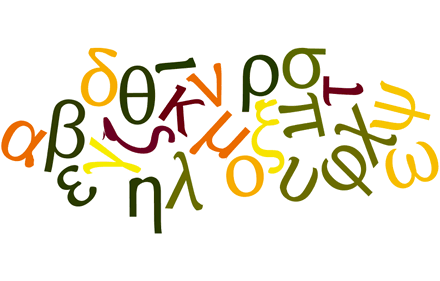Learn Greek
| English | Greek | |||
|---|---|---|---|---|
| Hello | Γειά σας | |||
| Good evening | Καλησπέρα | |||
| Goodbye | Αντίο | |||
| See you later | Τα λέμε αργότερα | |||
| Yes | Ναι | |||
| No | Όχι | |||
| Excuse me! | Παρακαλώ | |||
| Thanks | Ευχαριστώ | |||
| Thanks a lot | Ευχαριστώ πολύ! | |||
| Thank you for your help | Ευχαριστώ για την βοήθεια | |||
| You’re welcome | Παρακαλώ | |||
| Okay | Σύμφωνη | |||
| Okay | Σύμφωνος | |||
| How much is it? | Πόσο κάνει; | |||
| Sorry! | Συγγνώμη | |||
| I don't understand | Δεν καταλαβαίνω | |||
| I get it | Κατάλαβα | |||
| I don't know | Δεν ξέρω | |||
| Forbidden | Απαγορεύεται | |||
| Excuse me, where are the toilets? | Που είναι οι τουαλέτες παρακαλώ; | |||
| Happy New Year! | Καλή χρονιά! | |||
| Happy Birthday! | Χρόνια πολλά! | |||
| Happy Holidays! | Καλές γιορτές! | |||
| Congratulations! | Συγχαρητήρια! |
Objectives Would you like to learn Greek to understand and use the language in common everyday situations in Greece? Loecsen offers a structured Greek course for beginners, designed to reach the skills expected at the CEFR A1 level. Expressions and vocabulary are selected to reflect concrete situations, following a clear and coherent learning progression. Learning is based on complete sentences, grammar explained through usage, careful pronunciation work, and modern tools to support memorization. With 5 to 15 minutes of practice per day, you can reach your first A1 language goal and become more autonomous from your very first exchanges in Greek.
Learn Greek online: a free course for complete beginners
Greek is one of the most influential languages in history and remains a living language spoken daily by millions of people. For beginners, modern Greek may seem intimidating at first, mainly because of its alphabet and its long history. In reality, once approached through real everyday expressions and spoken usage, Greek quickly becomes accessible and logical.
The Loecsen Greek course is a free online Greek course for beginners, designed for people starting from zero. It helps learners begin understanding and using modern Greek from the very first lessons, with a clear focus on real communication.
The origins of Greek: from ancient roots to modern usage
Greek has one of the longest documented histories of any living language. It descends directly from Ancient Greek, which was spoken more than 3,000 years ago and used in philosophy, science, mathematics, and literature throughout the ancient world.
Over centuries, Greek evolved through several stages: Ancient Greek, Koine Greek (the common language of the Hellenistic and Roman periods), Medieval Greek, and finally Modern Greek, which is spoken today.
Modern Greek is not the same as Ancient Greek, but it preserves a remarkable continuity. Many core words, roots, and grammatical structures remain recognizable. This continuity is one reason Greek has had such a profound influence on modern languages.
Thousands of international words come directly from Greek roots, especially in science, medicine, technology, and culture. Words like philosophy, democracy, biology, theatre, or music all originate from Greek.
Learning Greek therefore gives learners insight not only into a modern language, but also into the historical foundations of many European languages.
The Greek alphabet: the real key to learning Greek
The Greek alphabet is often seen as the main difficulty for beginners. In reality, it is one of the most logical and consistent alphabets you can learn.
Greek uses its own alphabet, composed of 24 letters. Each letter corresponds to a sound, and Greek spelling is generally very regular. This means that once you know the alphabet, you can read Greek words aloud reliably, even if you do not understand them yet.
If you already know the Latin alphabet, the underlying principle is familiar: letters represent sounds, and words are built by combining them. The difference is visual, not conceptual.
| 1 | Α / α | άλφα - alpha - a |
| 2 | Β / ϐ (↔) | βήτα - bêta - b |
| 3 | Γ / γ | γάμμα - gamma - g |
| 4 | Δ / δ | δέλτα - delta - d |
| 5 | Ε / ε | έψιλον - epsilon - e |
| 6 | Ζ / ζ | ζήτα - zêta - dz |
| 7 | Η / η | ήτα - êta - i |
| 8 | Θ / θ | θήτα - thêta - th |
| 9 | Ι / ι | ιώτα - iota - i |
| 10 | Κ / κ | κάππα - kappa - k |
| 11 | Λ / λ | λάμβδα - lambda - l |
| 12 | Μ / μ | μυ - mu - m |
| 13 | Ν / ν | νυ - nu - n |
| 14 | Ξ / ξ | ξι - xi - ks |
| 15 | Ο / ο | όμικρον - omicron - o |
| 16 | Π / π | πι - pi - p |
| 17 | Ρ / ρ | ρω - rho - r |
| 18 | Σ / ς (→) | σίγμα - sigma - s |
| 19 | Τ / τ | ταυ - tau - t |
| 20 | Υ / υ | ύψιλον - upsilon - i |
| 21 | Φ / φ | φι - phi - f |
| 22 | Χ / χ | χι - khi - kh |
| 23 | Ψ / ψ | ψι - psi - ps |
| 24 | Ω / ω | ωμέγα - omega - o |
How to learn the Greek alphabet efficiently
To make this step easy, Loecsen provides an interactive sound-based Greek alphabet further down on this page. Each letter can be heard, seen, and used inside real words and short sentences.
How Greek sentences work in everyday situations
In modern Greek, meaning is carried mainly by the verb. Verb forms contain information about the person (I, you, we), the tense, and often the intention. This allows Greek speakers to build short, efficient sentences that work perfectly in everyday communication.
As a result, Greek sentences are often much shorter than their English equivalents, especially in spoken language.
Καταλαβαίνω (katalavaíno) – I understand.
This single verb already includes the idea of “I”. There is no need to add a subject.
Δεν καταλαβαίνω (den katalavaíno) – I don’t understand.
Negation is formed simply by adding δεν before the verb. The structure remains clear and predictable.
Θέλω αυτό (thélo aftó) – I want this.
Here again, the verb θέλω (I want) carries the core meaning, while αυτό (this) completes the idea. Word order stays flexible, but the sentence remains immediately understandable.
In everyday situations, Greek speakers rely heavily on such verb-centered sentences. This makes it possible for beginners to start communicating early, without having to master complex sentence structures.
By learning and repeating complete, high-frequency sentences, learners naturally absorb Greek rhythm, negation patterns, and verb usage. Over time, this repeated exposure builds intuition, allowing learners to understand and produce new sentences without consciously applying grammar rules.
A complete learning method to reach A1 in Greek step by step
Reaching a first functional level in Greek does not require long study sessions or complex theory. What matters is a clear path, regular practice, and the right tools. The Loecsen Greek course is designed to guide complete beginners toward a practical CEFR A1 level, focused on understanding and communicating in real situations.
The method is built around a simple idea: progress comes from repeated exposure to useful sentences, practiced in different ways until they become familiar. Instead of separating vocabulary, grammar, and pronunciation, everything is learned together, exactly as the language is used.
To support this progression, the Loecsen method combines several complementary tools:
- Short daily practice sessions to build a sustainable habit, even with just a few minutes a day.
- Listening-first exposure to help learners get used to natural Greek sounds and rhythm.
- Active repetition to anchor pronunciation and intonation through speaking.
- Progressive tests to reinforce memory and check understanding.
- Speech recognition to practice pronunciation and gain confidence when speaking.
- Smart review with a Spaced Repetition System (SRS) to revisit words and sentences at the right moment.
- AI dialogue tools to reuse what you have learned in everyday situations, without pressure.
- Learning with music to connect Greek with songs, videos, series, or personal content that motivates you.
This approach makes it possible to start understanding Greek early, recognize recurring patterns, and gradually speak with more ease, without feeling overwhelmed.
In practice, progressing toward A1 means:
- Practicing every day, even for 5 minutes, to maintain continuity.
- Speaking out loud as often as possible, even when practicing alone.
- Repeating the same sentences until they feel natural and automatic.
- Using Listening mode on low-energy days to keep Greek present.
- Writing short sentences by hand to strengthen long-term memory.
- Reusing familiar expressions in new contexts to build confidence.
By following this guided path, learners progressively move from recognition to understanding, and from understanding to simple communication. The goal at A1 is not perfection, but the ability to understand and be understood in everyday Greek.
Helpful anti-dropout tips when motivation decreases
Motivation drops are normal. The goal is to keep the habit alive, even on low-energy days.
- Reduce your goal to 2 minutes to make starting easy.
- Switch mode: listen instead of speaking, or reread a familiar phrase.
- Return to sentences you already know to regain confidence.
- Use content you enjoy through the Learn with music tool.
- Speak without aiming for perfection.
- Change the time of day you practice.
- Focus on being understood in simple situations.
- Use AI dialogue as a light, playful activity.
Consistency matters more than intensity.
Frequently asked questions about learning Greek
Is Greek difficult for beginners?
Greek may look unfamiliar at first because of the alphabet, but its pronunciation and structure are consistent. With exposure, progress is faster than many learners expect.
Can I learn Greek online for free?
Yes. Loecsen offers a free online Greek course designed for beginners, accessible worldwide.
How long does it take to read Greek?
Most learners can read Greek letters within a few days when using a sound-based approach.
Is modern Greek very different from ancient Greek?
Yes and no. Modern Greek is a living language with simplified grammar, but it preserves many words, roots, and structures from ancient Greek.






